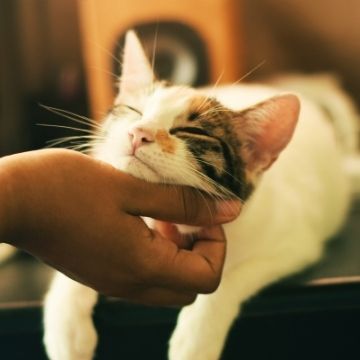Why Does My Cat Keep Going to Litter Box but Nothing Happens?
Your cat keeps going to the litter box every few minutes but nothing happens? Or do you find your cat peeing or pooping in very small amounts?
If you find your cat using the litter box frequently, it is necessary for you to find out why because it would be a symptom of diseases or indicate the mental and physical condition of your cat.
It is time to have an appointment with your veterinarian if it is traced to health issues. If it’s not due to medical issues, as its owner and friend, you have the responsibility to guide your cat the right way.
We have listed the most common causes and what you should do to help your cat.
Health issues
The following are the main causes that may lead your cat to go to the litter box quite frequently. Once your cat is developing one of them, take it to your veterinarian for professional help.
Feline lower urinary tract disease (FLUTD)
Feline lower urinary tract disease (FLUTD), which we also call feline interstitial cystitis or feline urologic syndrome, is the major culprit for your cat’s urinary symptoms. Here are the symptoms of FLUTD:
- Much more trips to the litter box every day
- Immoderate grooming of the genital area
- Abnormal urine smell, discolored urine, squatting to urine in front of you
- No large clumps in the litter box
- Acting painful
- Peeing in weird places
Urinary tract infection (UTI)
It usually attracts cats that are older than 10 years old. If your cat is attracted, you can find small amounts of stinky, blood-tinged urine in the litter box.
It’s difficult to tell the difference between UTI and FLUTD. That’s what your veterinarian is good at.
Feline urethral obstruction (FUO)
Although feline urethral obstruction has similar symptoms to the first two mentioned diseases, an FUO may threaten your cat’s life.
With an FUO, your cat will have trouble excreting poisons from the kidneys due to the inability to urinate. As the poisons build up in the bloodstream, the kidneys of your cat may fail to work, which might end up in death.
Constipation
In addition to urinary issues, you could face other diseases if your cat goes to the litter box frequently, such as constipation.
It is often seen in cats around 8+ years of age. If left untreated, it may develop a megacolon (abnormal enlargement of the colon).
Inflammatory bowel disease (IBD)
Just like irritable bowel syndrome (IBS) in humans, with an IBD, your cat will be faced with much more bowel movements, causing your cat to poop small amounts frequently.
Keeping the litter box clean is one of the best ways to prevent diseases. As a cat owner, you have the duty to scoop the litter box every day and change litter.
The soiled litter gets stinky quickly. Don’t forget to buy Litter Genie and Lionpapa generic refill bags to help you seal the smell. Lionpapa Litter Genie refill bags are made in 11 layers of EVOH materials, stronger and more durable than other bags.
A fresh and comfortable environment helps your cat recover and stay in good condition.
Non-health factors
Fortunately, not all symptoms are traced to health issues. Sometimes your cat goes to the litter box every few minutes because of mental and physical conditions.
Still learning
Has your kitten just moved into your home? If so, there is no need to worry about it. Your kitten needs to learn where the litter box is, get used to the type of litter and how to cover the excrement.
Asserting Dominance
Cats are territorial, your cat sits in the litter box doing nothing to assert dominance if you keep more than one cat. Although you have prepared litter boxes for every pet cat, your cat will communicate with other kitties that the litter box is hers by sitting in it.
So, prepare more litter boxes for your cats, at least each cat owns one.
In Labor
Once your cat goes into labor, she would choose the birthplace. The litter box is private and enclosed, which fits the bill.
However, you have to stop it because no matter how you clean the litter box, it contains bacteria, increasing the risk of catching infections for both the mother and the kittens.
Once your cat shows this symptom when pregnant, provide another nesting box for her.




